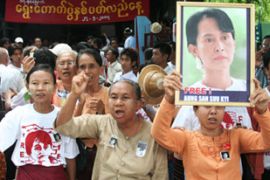Police block Suu Kyi prayer rally
Government ignores calls for her release and increases security around her home.

| Myanmar timeline |

1988: Military crackdown on pro-democracy protests, estimated 3,000 killed
1989: Aung San Suu Kyi sentenced to house arrest for allegedly endangering the state
1990: NLD wins landslide in national election; military refuses to recognise result
1991: Suu Kyi awarded Nobel Peace Prize
1995: Suu Kyi freed, but movements restricted
1997: Myanmar admitted to Asean
2000: Suu Kyi sentenced to house arrest for defying travel restrictions
2002: Suu Kyi released following UN-facilitated secret talks with government
2003: Government unveils “road map” to democracy; Suu Kyi returned to house arrest after her convoy is attacked in north of country
2005: Government announces shift to new capital Naypidaw
2007: Nearly 3,000 prisoners released in amnesty to mark independence anniversary, but no key political figures freed |
Security beefed up